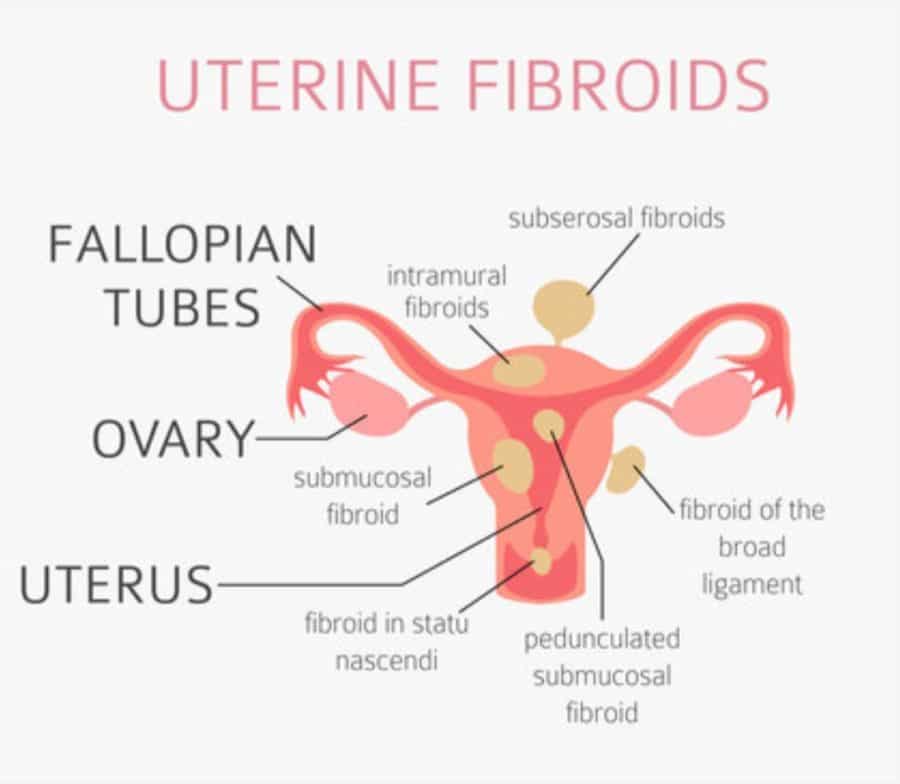There is a particular disease that has become the bane of our women nowadays; it has stricken fear into the hearts of our women as it affects them in so many ways even in Childbirth. The said disease is Fibroid and we can relate from the name how scared we are of it. Today am going to tell you all about it including the cost of fibroid surgery in Nigeria
Now, Fibroids are actually irregular growths that grow on a woman’s uterus. These said tumours can grow to become quite large in size and may cause the woman severe abdominal pain and heavy periods, while in some other cases; they show no signs and symptoms at all. These tumorous growths are usually noncancerous. The actual cause of fibroids in women is unknown and still puzzles scientists to date.
Symptoms of Fibroid
It is very difficult to notice or detect the symptoms of fibroid as they normally come without pain. This means that a woman with fibroid may not even know for a very long time until the issue gets worse, so regular checkup is advised. However, the most common symptom of fibroid is abdominal uterine bleeding.
If the fibroid tumours are located around the uterine lining or if they are located in such a way that they interfere with the flow of blood to the uterine lining, the patient could experience a heavy flow during her period, accompanied with pain. There could also be spotting between the menstrual periods. If this happens, it is advised to go to a doctor quick because Patients who experience heavy period due to fibroid tumours may develop iron deficiency anaemia, this is very deadly.
The symptoms of fibroid depend basically on the size, location of the fibroid and how close they are to core pelvic organs, but the most common symptoms are:
- Consistent pain in the pelvic region, including pain during sex.
- Consistent pressure on the bladder with recurrent or obstructed urination sometimes causing pain.
Pressure on the rectum/anus with painful or difficult defecation
Diagnosis of Fibroid
Normally, Fibroids are diagnosed by pelvic examinations, commonly known as an ultrasound scan. The hard part about the diagnosis is that the symptoms of fibroid also accompany other diseases, making it hard to detect the disease, hence, the importance of an ultrasound sound.
For instance, an ultrasound scan helps in differentiating fibroid from other reproductive diseases like ovarian tumours. The MRI and the CT scans are also amazing in diagnosing fibroids, but the ultrasound scan remains the simplest and most affordable method for imaging the pelvis and detecting fibroid.
Cost of Fibroid Surgery in Nigeria
As it stands now, the cost of fibroid surgery in Nigeria is between N130, 000 and N400, 000. However, this price is dependent on the factors that I am going to explain below:
Choice of Operation
The cost of fibroid surgery in Nigeria is heavily dependent on the choice of operation you decide on. Normally, your doctor depending on the severity of your case will recommend the best type of surgery to you. The two most common types are abdominal myomectomy and laparoscopy myomectomy.
Now, an abdominal myomectomy is the type of fibroid surgery that requires a large incision on the lower abdomen to help the doctor gain access to where the fibroid is located. Although this type is one of the cheapest when you consider the cost of fibroid surgery in Nigeria, it is still quite expensive. Most hospitals will charge between N130, 000 and N250, 000 for this particular type of fibroid surgery.
If you opt for the other type, which is the laparoscopic myomectomy, please note that this one is a more tricky process that requires a higher level of expertise and attention to perform. Although this process is almost bloodless and heals faster than the abdominal myomectomy method, it is much more expensive and sensitive than the former. Hospitals generally charge between N250, 000 – N400, 000 for this particular type.
Location of Hospital
The location of the hospital is a very important factor to consider when you are budgeting for the fibroid operation cost. This is because there is no specified amount for the operation in Nigeria and it depends on where you are doing it. Typically, the surgery is much cheaper in Federal and state-owned hospitals, no matter the type. The same cannot be said about Private hospitals.
While private hospitals boast of similar experienced medical practitioners as their federal and state counterparts, they are much more expensive than the public hospitals. Some private institutions even charge as much as N2 million for the surgery process or more. Also, note that Fibroid surgery in hospitals located in Lagos, Abuja or in Port Harcourt will be more expensive than those located in other less popular states.
The expense of tests and post-surgery
An important factor to consider for the surgery costs is the host of tests you do before and after surgery. You may need to consider how much the different tests cost. Patients may also be required to pass through some examinations after the surgery. These Tests are not so expensive; these tests can be as low as N1, 500 or as high as N20, 000 depending on the hospital.
Some Other Extra Charges
Normally, Apart from the overall fees, you will have to pay for the surgery, most hospitals, whether it’s private or government, will require you to pay some extra charges. These extra charges could include but are not limited to admission charges, some drugs, and other related charges, Also, depending on the surgery type, you might be required to buy a pint of blood as the patient may lose some blood during the process and may require blood transfusions.
That’s basically all you need to know considering the cost of fibroid surgery in Nigeria.





